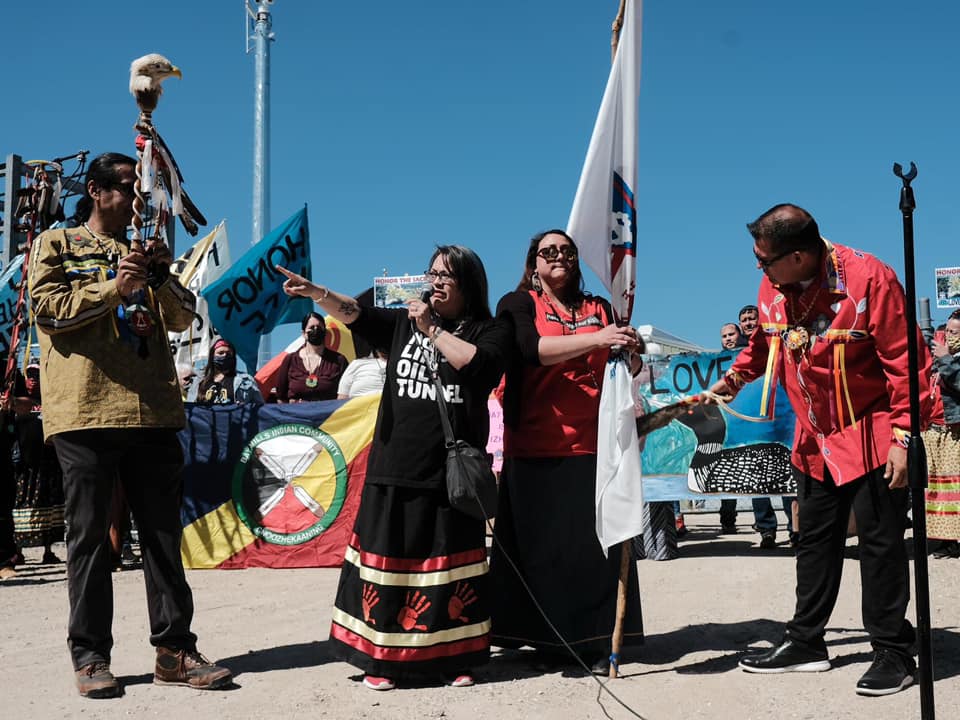URGENT Call to Action: Submit public comment to EGLE, Michigan’s Department of Environment, Great Lakes, and Energy by this Friday, August 29 in opposition to the requested permits by Enbridge, necessary to build the Line 5 Tunnel. We encourage you to check out the wonderful summaries from our partners at Groundwork and Oil & Water Don’t Mix with talking points and easy to submit comment forms as well as this recently published in-depth video summarizing the dangers and the need for immediate action.
We also invite you to revisit the powerful words of our beloved late friend and colleague, Holly (ba) T. Bird, who worked tirelessly as part of the movement to Shut Down Line 5. She shared these words at the Spring 2021 “Evict Enbridge” event.
“On May 13th, I marched with hundreds of other water protectors to the Enbridge Line 5 Pump Station at McGulpin Point, Mackinaw City, Michigan. There we raised our hearts and voices for the water, for the sacredness of her spirit, and her right to be free from the risk of destruction from the Line 5 oil pipeline. As part of a group of Indigenous leaders and community members, I spoke on how the oil industry has been destructive to our people – both with respect to MMIW (Missing and Murdered Indigenous Women), our health, culture, and ability to subsist.
In the 1970’s the Texaco-Chevron Oil Company dumped millions of gallons into the Amazonian rainforest and installed hundreds of unlined pits in the jungle. Soon the Indigenous people of that territory became ill, suffered birth defects and cancer. Out of the Ecuadorian and Amazonian tribes affected – at least 4 became extinct.
In 1989 the Alutiq community, an Alaskan Tribe reliant on hunting and fishing on the ocean lost food, community and their cultural practices, lost their ability to feed themselves safely because of the Exxon-Valdez oil spill. To this day, the sea beds are still unsafe and 1/2 of all species of life that lived there have never come back. The Alutiq call the day of the spill – “The Day the Water Died.”
In 2010 the BP Deepwater Horizon oil spill affected the indigenous tribes of Louisiana – the Choctaw, the Houma, Chitimacha, Atakapa, Ishak – who made their living on shrimping boats. The health of the Tribal fisherman was affected worse than even the oil workers. Many of these Tribes lost their ability to subsist on their Louisiana shores.
In 2020 the Nornickel Oil Company in Russia spilled oil so many times in the Arctic Tundra, that they created a dead zone around an entire city in Siberia. The Indigenous people of that area – the Dolgans, Nenets, Nganasans, Evenkis, Enets – found their land destroyed and their livelihood depleted despite Nornickel’s yearly “support for cultural events.”
Currently, many more Tribes are threatened by the oil industry – the Tribes of Montana, The Dakotas, Nebraska, and down through Oklahoma; the Tribes of Michigan, Minnesota and Wisconsin. Plus those north in Canada – the Anishinaabe, the Cree, the Wet’suwet’en and all of those along the Northern oil and gas routes.
In addition to the illness and destruction to our ways of life and livelihood – our women and children are being affected by violence because of the oil industry. A study showed an 18.5 percent increase in violent crime in North Dakota’s Bakken oil boom counties between 2006 and 2012, compared to a 25.6 decrease in counties that weren’t being targeted for oil and gas extraction. In those same regions of North Dakota, the incidence of unlawful sexual conduct and aggravated assault increased 44.8 percent and 70.1 percent, respectively, from 2006 to 2012, compared to declines of 6.7 percent and 4.4 percent in non-Bakkan regions.
The Berthold Reservation, which saw its population temporarily balloon by 30-70 percent over the course of the Bakken oil boom years, was hit particularly hard: in 2012, tribal police reported “more murders, fatal accidents, sexual assaults, domestic disputes, drug busts, gun threats, and human trafficking cases than in any year before,” per The Atlantic.
In February 2021, a sex trafficking sting in Minnesota led to the arrest of seven men – two of them Enbridge contractors. Sex trafficking of Indigenous women in Minnesota was at an all-time high. All of this adds to the increase of the following statistics:
- Indigenous women in this country face murder rates that are more than 10 times the national average.
- Homicide is the third highest cause of death in Indigenous women and girls 10-24 years of age, and the fifth for women between the ages of 25-34.
- In Canada, Indigenous women are less than 5% of the total female population, but in 2015 they comprised 25% of all murdered women in the nation.
These extraction industries, they treat the Earth like they treat women. They think they can own us, buy us, sell us, trade us, rent us, poison us, rape us, destroy us, and use us as entertainment. That very same mentality that they are using for this industry, it translates to the work that they do.
What you are witnessing is ecological genocide of our people. Enbridge and Line 5 are part of that ecological genocide. We ask you to stand strong together to save our Great Lakes and to save our people. NO MORE OIL IN OUR LAKES NO TUNNEL THROUGH OUR WATER.”
Holly (ba) T. Bird, speaking at the spring 2021 “Evict Enbridge” event. Photo by Thomas Gilpin.
Holly (ba) T. Bird, speaking at the spring 2021 “Evict Enbridge” event. Photo by Laina G. Stebbins.
Watch this in-depth video compilation of clips from recent webinars by FLOW, Oil & Water Don’t Mix, and Groundwork highlighting the dangerous gamble that the proposed Line 5 tunnel is for the Great Lakes.
“I have concerns about this pipeline because I see a storm coming.” – Holly T. Bird, speaking in a 2017 public comments hearing.




